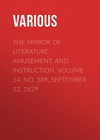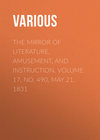Czytaj książkę: «Ainslee's magazine, Volume 16, No. 3, October, 1905», strona 8
III
“For a spotless child of heaven, Cecilia’s playing the game pretty well,” I mused, as I watched her at dinner. During the hour of dressing she had pulled herself wonderfully together. She held her little round chin high in the air and devoted herself to Drake with all the aplomb of a Felicia.
The cup of bitterness held its touch of sweet to her. Even if one must suffer, one was out in the world, one was living, was what I read in her attitude. But as I have said, I don’t pretend to understand women; still, I’m much mistaken if, during dinner, at least, she didn’t have a good time.
She ignored Almington as much as she could in a general conversation.
“Mrs. Massingbyrd can have you,” her attitude seemed to say. “I fight for no man.”
I looked at Drake. If he wanted to keep his rose in the bud, he had better carry her away quickly to a fresher atmosphere.
At the end of dinner the ladies exchanged nods and smiles. I saw that an explanation was forthcoming for the mysterious visit to the stable.
They had been preparing what to me seemed not unlike a little amateur Walpurgisnacht.
It was, of course, Lydia Massingbyrd’s idea. Nobody else, not even Felicia, could have been wrong-minded enough to want to slide downhill in summer. My coachman’s children have a species of roller sled on which they daily endanger their lives by coasting down the steep macadamized road which leads from my house.
“I saw them on my way from the station,” proclaimed Mrs. Massingbyrd, triumphantly; “and saw at once their possibilities.”
“Will you steer me, Mr. Curtis?” asked Cecilia, turning her back on Almington, and giving poor Drake a killing glance; and I thought I surprised a glance of malicious intelligence pass between Mrs. Massingbyrd and my wife.
Now, I know that, told in plain words the morning after, most of our maddest fun seems flat and puerile enough. I know that a decent married man of my age and a lady killer of Almington’s ought to have poohpoohed this childish sport, and sat with our cigars and our whiskies and sodas on the piazza.
I suppose you think that’s what you would have done. But I can tell you, if you had dined with Felicia and Mrs. Massingbyrd, you’d have been caught up in the fire of their folly. It’s contagious, more than anything I know. In the glamour of their lovely nonsense sliding downhill on the coachman’s children’s roller sled would have seemed an appropriate and delightful thing – or sliding down the banister or the cellar door, if it had been their mad whim to do that.
Haven’t you ever been a kid since you were grown up? Did all your fooling stop before you were out of college? I’m sorry for you if it’s so. I hope, for my part, that Felicia and Mrs. Massingbyrd and their like will make me forget my years for a long time to come. And I hope often to wake up in the sober light of the next day wondering just what magic it was that had turned back the hand of time for me, that I could find merriment in sliding down a macadamized hill on a roller sled.
The night was cold, with a bit of a breeze; there was a moon, and the glow from Felicia’s gayety and Lydia Massingbyrd lasted my little companion on our first swift, delirious slides.
It wasn’t coasting, but it was exciting enough, as one went very fast. And coming up we piled into a cart to be drawn up the hill. But after a few slides the flame of my little friend’s gayety flickered out, and as the others were piling into the cart, “Let’s walk,” Cecilia suggested. Youth is ever selfish in its distress, and what did Cecilia care whether my legs were tired or not climbing that hill? Her little flock of conventions had come fluttering back to her. Her doll was sawdust, and there was a bad taste in her mouth.
Now, of course, you know that there’s nothing more revolting than the folly of others when you yourself are serious. Haven’t you been annoyed time and again by the senseless and meaningless good spirits of the people next door? I’m sure you have. And just as often you’ve felt a certain compassion for the people who give you sour looks and grim glances when you’re having the time of your life.
So it was with ever-increasing disapproval of my wife’s merriment and Mrs. Massingbyrd’s abandon that Cecilia walked up the hill with me.
“I think,” she confided to me, sadly, “I was born old!”
“There are some people who stay babies forever,” I encouraged her.
“They are the fortunate ones,” Cecilia said, gloomily. “I never have been able to enjoy things long at a time. Even our good times at school used to seem childish to me. And I thought when I came out and was among grown people – ”
“That things would be different,” I supplemented. “And you find it’s just the same.”
“Just the same,” she agreed, in a gratified tone. “I feel as old as I did at school!”
“Some people are born with a realization of the futility of pleasure,” I went on, trying to voice Cecilia’s mood.
“I suppose it’s that,” she sighed. “When I was at school I thought of the world as a playground where I could amuse myself with the others.”
“And instead, you find that you’re only learning a different kind of lesson, and play is as uninteresting as ever?”
“Yes, it’s just like another kind of school, and the lessons harder to learn – and of less use when you’ve learned them!” There was a pathetic note in her voice.
“You’re very different from other girls, Miss Bennett,” I felt was an appropriate and comforting thing to say.
“I know I am, and it’s a great misfortune to be so,” she acknowledged, with becoming modesty.
“But it has its compensations.”
“It’s very lonely,” she said. “No one has ever understood all I think and feel. Mamma never has, nor the girls.”
“And since you’ve been out?”
“Since I’ve been out I met some one – once” – the once threw the time of meeting in the remote past – “some one I thought understood me – but I was disappointed.”
I murmured something sympathetic.
“Because I’m young in years people think I can’t see things,” she cried, with a little rising temper.
“You have the best possible vantage, then, to observe the world as it really is.”
“And I do see things as they really are, and many things!” and she clinched her little fists under cover of the darkness. Things were getting somewhat strenuous for me, so I brought our conversational boat to smoother waters.
“You make me think a little of Ellery Drake,” I said. (Machiavelli to the front!) “Because he seems so simple and direct; shallow people don’t take the trouble to understand him. But you’ve seen, of course – ”
“Yes,” she assented; and I saw she was interested.
“What a lonely time he has of it, and under his apparent simplicity how much depth there is.”
“I’ve known him all my life – but I’ve never really known him – that is, what I call knowing a person.” There was a great deal of intensity in Cecilia’s voice. “Ah, how hard it is to really know any – and so few realize it.” The atmosphere was getting a little rarefied, so I was glad of the diversion caused by the two roller sleds whiffling by us.
“We’re racing,” called Mrs. Massingbyrd. “If we win, I’m to grant a boon to Jack Almington.”
“He’ll probably ask her to take down her hair,” said Machiavelli. “Men always do.”
“Oh, if that sort of thing amuses him” – contempt spoke in Cecilia’s tone – “let him have – his hank of hair!”
“There’s a remarkably happy man,” I said. “No still waters in his; a perfectly delightful fellow, only spoiled by women!”
“Is he?” asked Cecilia, indifferently.
“He’s been so immensely liked, you know, that what he really needs is a snub. He thinks he’s only to look at a woman for him to like her.”
“Wouldn’t one call that just a trifle conceited?” Cecilia’s voice dripped sarcasm.
“Not in his case,” I returned, cruelly. “For, you see, it’s generally so. I’ve never known a more fatal man than Almington.”
“He’s not always fatal,” Cecilia gave out, dryly; and she shut her little mouth with a firmness that even in the dim moonlight made itself visible.
We stood at the top of the hill in silence for a moment, waiting for the cart with the others in it. They came up laughing. How vain and empty their laughter was, I was sure Cecilia was thinking. Her deep knowledge of the world and its iniquity were fairly bowing down her young shoulders.
IV
The laughter and nonsense grew louder, and I descried, standing upright in the cart, a vision, spirit or woman I couldn’t tell.
My companion stared a moment and then remarked:
“Mrs. Massingbyrd’s hair has come down!” Into these simple words was packed all the quintessence of disapproval that Cecilia had learned from her various advisers. There were echoes of her mother’s shocked tones, haunting accents of her offended teacher, all welded together by the cool disapproval that was Cecilia’s own.
I am sure that if my delightful little guest could have heard the awful, the chilling, contempt of “Mrs. Massingbyrd’s hair has come down,” she would have veiled her face with it in abject shame.
I gathered by her attitude and that of Felicia and Almington that these silly creatures were playing at tableaux, the cart serving as a Mi-carême char.
Mrs. Massingbyrd’s hair, more miraculous than ever in the moonlight, fell down to her knees. Her eyes looked seraphically heavenward. Almington held her hand, kneeling before her, while Felicia, a little shawl disposed as drapery about her, was pointing dramatically out into the night, giving an admirable impersonation of those statuesque young ladies who, in tableaux, have no raison d’être save to round out the composition and look pretty.
Later I learned that the name of this impressive tableau was: “The Triumph of Virtue.”
At that moment I was too occupied with the attitude of my little companion to pay attention to Mrs. Massingbyrd’s foolery.
Cecilia had just caught sight of Almington as he knelt, holding the hand of Virtue, his lean legs bent like the blade of a knife. Almington generally cuts a fine figure, through a certain sense of the fitness of things. His air of secret melancholy wins half his battles for him, and he is one of those men who must at any cost hang on to the last shred of dignity, as they are nothing without it. In his present situation I have no hesitation in saying he looked fatuous and grotesque.
How he came to lend himself to the crazy whim of the two girls I can’t tell. I suppose he was carried away by the flood of their high spirits, as many a wiser man has been before him and will be after him.
But if I had excuses for him, Cecilia had none.
It may be heartbreaking to have your first “serious young man” leave you at the smiles of a pretty widow with blond hair; but, after all, by showing how truly noble you are, you may some day crush your rival and bring your suitor to your knees, crying, “Peccavi!” It’s bad to learn he’s a heartbreaker, but, after all, then there’s all the more incentive to break his heart. You can, whatever happens, bear your suffering nobly, and at the worst you have lots of things, heaps simply, to tell the girls.
But to have your first hero of romance make himself ridiculous – that is the end of all things. Sorrow has then no dignity. A broken heart for a man like that is out of the question. Oh, it’s a bitter thing to think the drama of one’s life a tragedy and have it turn out a low comedy!
Cecilia saw her hero exactly as he was, at that moment, stripped of all adornment.
Glamour died, romance withered away; in the clear fire of her uncompromising young scorn.
She was proving again that man’s only unpardonable crime toward the woman who loves him is to make himself ridiculous.
It was really quite a dramatic little moment. The late hero, now turned mountebank, descended and helped out Felicia and Lydia, radiant in her white and gold attire – and it was only then I saw Drake, who had been sitting stiffly in the back of the cart.
He had taken no part in the pageant. If his temper was impaired, his dignity wasn’t. Sliding downhill was all right, his rigidity seemed to say, but no play acting in his. His mood and Cecilia’s jumped together. Her eyes met his. “I know you now,” her grateful glance seemed to say.
Meantime Mrs. Massingbyrd, lovely as an angel, drifted along the white road.
“It’s breaking the rules of the game,” Felicia said to her, “for you to have taken down your hair.”
“It fell down itself,” answered Lydia the unashamed.
“But you looked so entirely lovely,” my wife went on, “that I forgive you. It’s worth the price.”
And I guiltily hoped that Mrs. Massingbyrd would refrain from saying, “That’s exactly what Bobby said.”
She stood pensive a moment in the moonlight. Drake and Cecilia, drawn together by the feeling of superiority they shared in common – and which I had helped to point out – wandered off together. Almington was absorbed in an open and impertinent admiration of Mrs. Massingbyrd’s beauty, and Felicia and I gazed at her, and again Felicia said, approvingly: “It’s an unfair advantage to take – but it’s really worth it!”
Then the dreamy look in lovely Mrs. Massingbyrd’s eyes deepened, and she opened her lovely lips and said:
“Felicia, I’m so desperately hungry that I wouldn’t coast down that hill again – not for anything! Did you say you had something good for supper?”
“And at supper I shall ask my boon,” Almington answered.
“Boon?” said Mrs. Massingbyrd, as she watched Cecilia and Drake vanish together in the moonlight among the flowers. “Boon? You greedy person! Isn’t it boon enough to have seen me with my hair down by moonlight! I wonder at your graspingness, Jack Almington!”
* * * * *
After we had said good-night to our guests, after Cecilia and Drake had at last come in from an interminable talk on the piazza, after Mrs. Massingbyrd had stuffed herself – in the face of her ethereal loveliness I hate to use such a word, but I know no other; indeed, she applied herself to supper with such a fair, frank and honest appetite that she had neither eyes nor ears for Almington’s compliments – after all this was over, Felicia turned to me with a look of satisfaction.
“You played up nobly that time, Robert,” she said. “I’ve never known you to catch on so quickly and without a word from anyone.”
I gained time with remarking, pathetically, “You’ve always underrated my intelligence.”
“I call it a thoroughly artistic performance,” my wife said; “and the beauty of it is that there was no talk, no nothing, but each one doing his work.”
I looked at Felicia, to see if by any chance she was making a pitfall for me, but there was no danger signal. I thought it safe to give out, “I’m glad you liked my little share in it.”
“You were splendid,” she cried, cordially. “And if Miss Bennett only knew it, we deserve a vote of thanks from her.”
“Yes, don’t we?” I took care not to commit myself.
“It isn’t as if we hadn’t provided Cecilia with another suitor, and I’m sure Ellery Drake, from any point of view, is far more desirable than Almington.”
“I should say he was,” I cordially assented.
“And then, who can tell if Almington was really serious? And for a young girl to be affichée with Almington her first season is nothing short of tarnishing,” Felicia went on, virtuously.
“That’s what I’ve said from the beginning,” I put in.
“And you certainly played up nobly. We couldn’t have put it through so quickly without you,” my wife was generous enough to confess. “But did you ever see anything as splendid and self-sacrificing as Lydia?”
“Self-sacrificing?” I wondered, feeling my way.
“Why, she made herself odious – simply odious – in Cecilia’s eyes, so Cecilia would feel furious at having Almington like her.” Sometimes Felicia is anything but lucid.
“Like whom?” I naturally wanted to know.
“Like Lydia,” replied my wife, impatiently. “A girl can stand anything but having a man she likes fall in love with a woman she doesn’t. It’s queer,” she said, suspiciously, “clever as you are sometimes, how dense you are others. Did you understand – ”
But at this late date I wasn’t going to have my laurels snatched from me. So I hastened to assure her. “Of course,” I said, loftily, “I understood Mrs. Massingbyrd intended to interfere!”
AUTUMN
SCARLET her cloak, her lips all scarlet too,
Her cloudy hair as golden as the leaves
Of the sun-mellowed hickories, her voice
The rich, low whispers of the brooks that please
By hinting Autumn mysteries, her eyes
Witch-lights of laughter and of mad surprise.
Oh, gypsy prodigal, who gives and gives,
Till penury in winter strips you bare,
Cover me with the splendor of your locks,
Let your eyes challenge me from dull despair —
Wake me and sting me till I, too, shall sweep
Round in the revels that your whirlwinds keep.
Clinton Dangerfield.
THE WARRENERS
By MARIE VAN VORST
CHAPTER I
GERTRUDE Warrener was twenty-five years old on the day she went into the back library and, seated in a rocking chair, a newspaper and a box of candy-kitchen chocolates in her lap – began to live.
Hitherto the boundaries of her lifeline had been limited by a wooden fence circling a few feet of coarse grass and two frame houses like her own. To the rear, in the yard, four poles formed a square with peculiar precision, and on washdays the level lines of a cord, stretching cat’s-cradle-wise, supported the household laundry.
She had taken for eight years the front rooms of the house for her point of vantage, and when she had mentally stated “Mrs. Felter’s just gone into the Perches’,” or “Pearl Exeter does her marketing in the afternoons instead of the mornings,” she had nothing further to say. One day she caught herself in the middle of some such banal reflection, and, going to the back of the house, took her place in the window of a microscopic library.
Gertrude Warrener did not remotely dream that she on this day passed the Rubicon lying between existence and life.
When the mind is sensible of inertia – the eyes catch sight of living forms, and the soul yearns toward something which it has not – it may be taken for granted that a life-breath has blown over the valley of dead bones.
In the case of Gertrude Warrener, it was indeed a tomb in which she awakened, and she did not know that she had been immured.
In her seventeenth year, George Warrener, just received into a subordinate position in a New York banking and broking firm, began to pay her his bashful attentions. With no spoken words on his part that she could remember – nor could he for the life of him have recalled the formula – there was an engagement. She married him before her eighteenth birthday.
As she sat in the library, all image of the youthful lover was completely effaced from her mind. He was now like hundreds and dozens of other middle-rank business men. Of medium height, stocky, his hair and short, stubby mustache nondescript, his eyes blue, wide apart and rather small, he was a successful type and entirely sacrificed as an individual. He often said:
“I look like a prosperous Wall Street man, and that is as near as I shall ever come to it – to look like it.”
But in spite of his dapper appearance, Warrener was an overworked drudge. He worked so hard and so long, his daily trips on unhealthy ferries and hot cars sapped his vitality to such an extent, that all his life had been spent and lived by the time he crossed at night the threshold of his home.
Gertrude in the little library opened the pages of the Slocum Daily slowly. She read the town gossip, a local weather prediction, an account of the hospital fair; and as she rocked and ate one after the other the chocolate marshmallows she had a feeling of freedom, whose cause was due simply to the fact that she had changed her point of view – due to the humble novelty of her transposition.
George’s library smelled of stale tobacco. She had sensitive nostrils, and was beginning to find the dead odor unpleasant, when at this point she fell upon an item in the Slocum Daily which held her attention:
We are glad to learn that the McAllister homestead has been opened. After the long absence in Europe of the family, Mr. and Mrs. Bellamy have returned, and Slocum welcomes them back with much pleasure.
“Slocum!” She spoke aloud, and there was scorn in her tone. “Well, I guess they’ll laugh at that. I don’t believe they care for the Daily!”
Old Mrs. McAllister at once took form for her. She had come to their wedding, and Gertrude remembered her as tall, and that her dress and hat became her. The young, light-minded bride had remarked the difference between this guest and other Slocumites.
Kept in state on the buffet downstairs was a silver pitcher, the sole real silver in the house. Mrs. McAllister had sent it to the Warreners as a wedding present.
Gertrude got up and went out in the hall. “Eliza!”
“Yes, ma’am.” The maid of all work appeared at the foot of the back stairs.
“Say – just go and get that silver pitcher off the dining-room buffet and clean it. I guess it hasn’t been cleaned for three years.”
The maid looked at her in astonishment. “Why, we haven’t got a mite of cleaning powder in the house, Mrs. Warrener!”
Mrs. Warrener came slowly down the stairs herself, and, going to the dining-room buffet, looked at her wedding gift – or what she could see of it through a thick layer of dirt and discoloration. Then she carried it to the bathroom, and, with nail brush and tooth powder, shone it up as well as she could. It was a tribute of welcome to the return of the Bellamys.




















